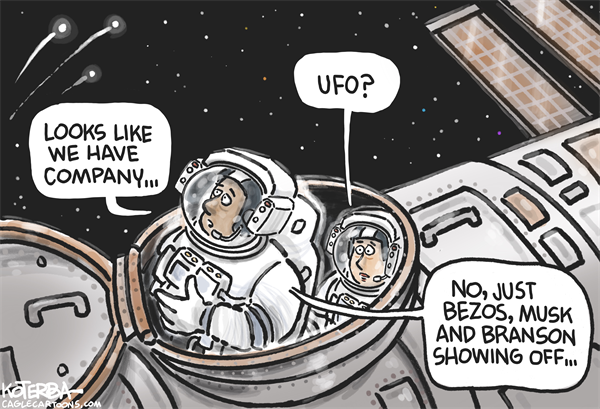There’s a fine line between a public-private partnership and a government handout.
A private-public partnership would be akin to the West Virginia Legislature approving $37 million in surplus state funds to assist in closing a deal for the Mylan plant in Morgantown — should such a deal take place. In this case, the offer is mostly an incentive to attract private business to the area (most public-private partnerships are). But we also know the impact the plant closure — a possible reopening under new management — will have on our region and our entire state.
A government handout — under the guise of a public-private partnership — is what’s happening between Congress and Jeff Bezos’ Blue Origin and Elon Musk’s SpaceX. In May, The Intercept reported Congress had allocated NASA $10 billion, which it could in turn award to a private contractor. Several space companies bid for the contract and Musk’s SpaceX got the contract. The Intercept also reported an amendment by Sen. Maria Cantwell (D-Wash.) had been proposed to the Endless Frontier Act that would give NASA another $10 billion contract, this one expected to go to Bezos’ Blue Origin, which is headquartered in Washington.
In June, the Senate passed The U.S. Innovation and Competitiveness Act, S 1260, the final incarnation of the Endless Frontier Act, which has not yet passed the House. Included was the provision requiring NASA to choose two companies to develop lunar landers as part of its Human Landing System program, preserving the contract already given to SpaceX and allocating an additional $10 billion for a second company.
In February, Business Insider reported that Bezos had a “$196 billion fortune.” In March, Fortune placed Musk’s net worth at $156 billion. Companies owned by the world’s richest men don’t need government handouts in the form of billions of dollars in contracts.
Space exploration has its place. There is much to learn about our solar system, but while the knowledge has value, space travel has little impact on the average person. For Bezos and Musk, space travel is a pet project — a bit of one-upmanship to see which billionaire can make it there first. But both men have more than enough of their own wealth to invest in their space shenanigans.
Our issue stems from this: Multi-million- and multi-billion-dollar companies are handed millions and billions in government funds — taxpayers’ money — and it’s considered the cost of doing business. And it’s especially disturbing to see it framed as “infrastructure,” the way Bezos’ and Musk’s space games have been. But heaven-forbid a senior on Social Security get a few hundred dollars a month or a low-income family get SNAP benefits to help with groceries.
Half the argument around President Biden’s proposals, particularly his infrastructure plan, is the government has no money to spend on such things. How many roads and bridges could be fixed for $10 billion? How many public transportation systems could be saved and updated? How many lead water pipes could be replaced?
We’re getting tired of watching the hard-earned money of everyday people — who actually pay their taxes — be funneled into the pockets of multi-billionaires and their corporations under the guise of a public-private partnership when the benefit to the public is negligible.




